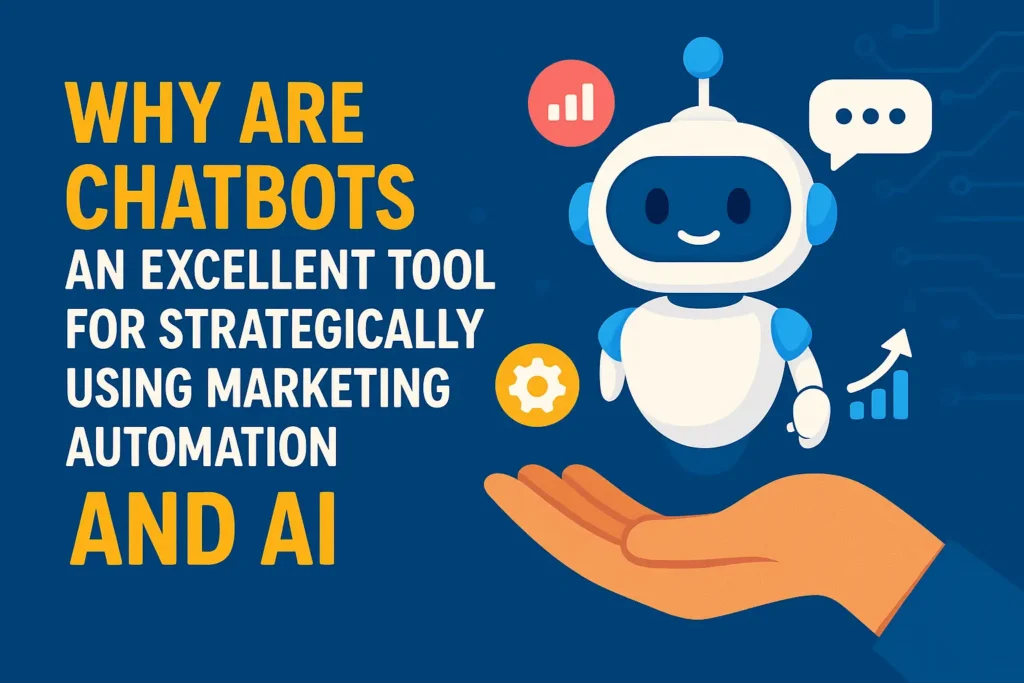In recent years, Apple has gradually moved from being just a hardware and software company to a player in artificial intelligence and search. Rumours and reports now suggest that Apple is set to launch its own AI-powered search capability, internally referred to as World Knowledge Answers, to compete with Google, OpenAI, and Perplexity.
In this blog, we explore what the Apple search engine is, when it will come out, what “world knowledge answers” implies, how it may change search, and how it compares to Google. We also include a strong FAQ section to answer common questions, such as “Does Apple have their own search engine?” or “What search engine does Apple use?”
What Is the Apple Search Engine?
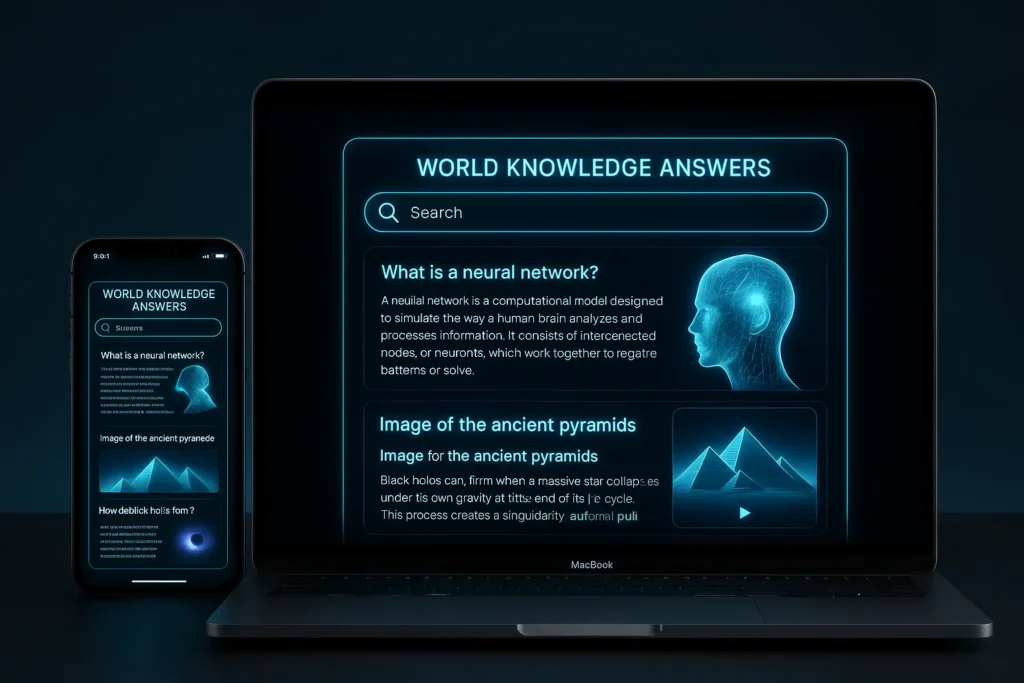
From Search to “Answer Engine”. Rather than a traditional search engine like Google or Bing, Apple’s proposed solution is more of an AI-powered answer engine. Internally, Apple is developing a system codenamed World Knowledge Answers (WKA).
The idea is that WKA would process user queries using large language models (LLMs), fetch relevant information from across the web (and possibly Apple’s own indexed sources), and generate a concise, multimodal answer, combining text, images, and video, rather than just returning a list of links.
This is why many describe it as an “answer engine” or “search + summarisation” hybrid.
Key Features (Expected)
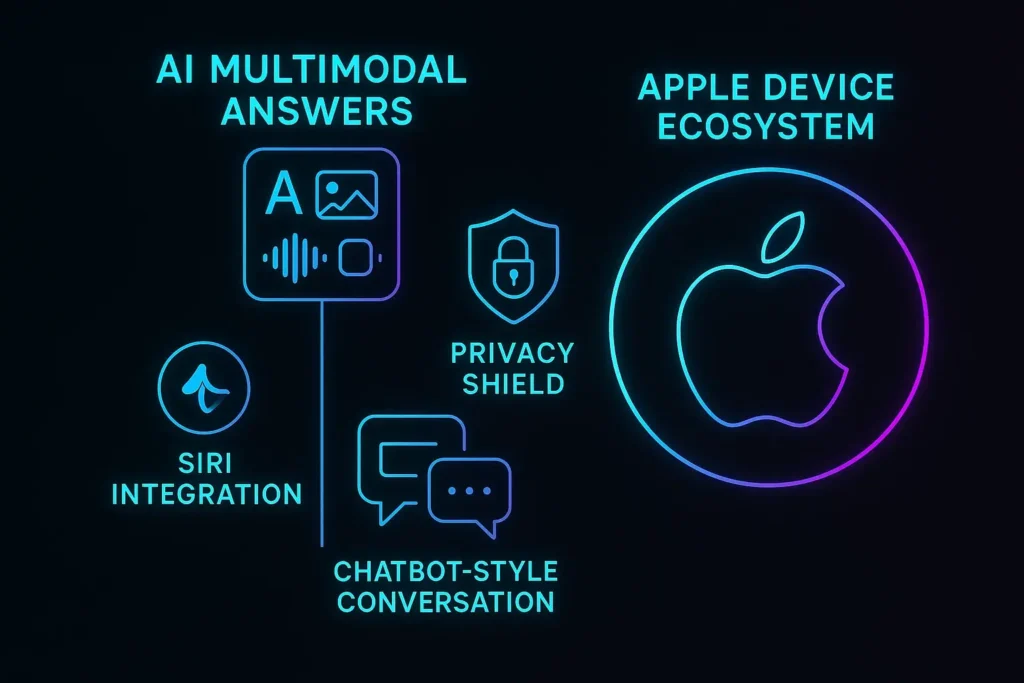
Based on leaks and reporting, here are the features of Apple search engine (World Knowledge Answers) is likely to include:
| Feature | Description / Benefit |
|---|---|
| Multimodal answers | Ability to respond with a mix of text, images, videos, maybe maps or local results. |
| Deep integration | Built into Siri, Safari, and Spotlight, so answers are surfaced across Apple’s ecosystem. |
| Privacy-centric architecture | Apple is likely to process private or personal queries using models designed to respect user privacy (on-device or with limited external exposure). |
| Use of external models/partnerships | Apple reportedly may test or integrate models from Google (such as Gemini) or others, especially for specific functions like planning or summarisation. |
| Conversational refinement | Like a chatbot, the system may allow follow-up questions or contextual clarifications. |
Because Apple has emphasised conservatism in releasing AI features, WKA is likely to roll out gradually, initially powering Siri’s responses and later expanding to Safari and Spotlight.
Why Apple Is Doing This?
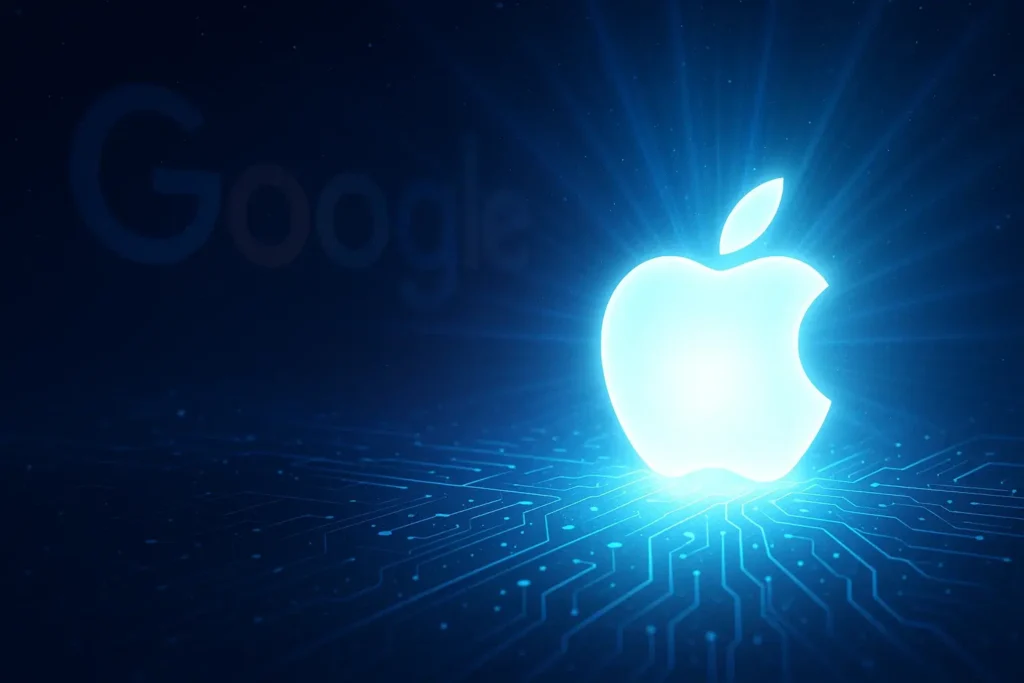
- Reduce reliance on Google: Apple has long had a partnership with Google to make Google the default search engine on iOS and macOS. However, that model is under pressure, partly due to regulatory scrutiny and partly due to changing user behaviour with AI.
- Control the user experience: Apple can more tightly control how queries are answered, bias is managed, and the design of the responses. This aligns with its approach across iOS, hardware, and services.
- Leverage AI as the next frontier: Search as a domain is shifting from pure index + ranking to generative AI. Apple’s move into “world knowledge answers” is its entry into this new paradigm.
- Ecosystem advantage: With hundreds of millions of active Apple devices, Apple already controls endpoints (iPhones, iPads, and Macs), providing a built-in distribution channel for its search/answer experience.
When Will Apple’s Search Engine Come Out?

Predicting exact Apple release dates is always risky, but current reports suggest a launch in spring 2026, potentially coinciding with iOS 26.4 and a revamped Siri.
Mark Gurman’s reporting suggests that Apple’s internal team refers to “World Knowledge Answers” or simply “Answers” and expects it to first appear in a new Siri feature before being integrated into Safari and Spotlight.
One article states:
“Apple’s new in-house AI search product might arrive … internally dubbed World Knowledge Answers … scheduled for March as part of the new Siri.”
Another states:
“The upcoming LLM version of Siri is on track to launch as early as March 2026 … Along with the world knowledge feature …”
Therefore, while no official Apple announcement has confirmed the date, March 2026 (or early 2026) seems to be the most widely cited timeframe.
Apple may roll out the engine gradually, first in Siri on iOS, then to Safari, and finally to Spotlight on macOS.
How It Compares with Google (and Other AI Search Tools)?
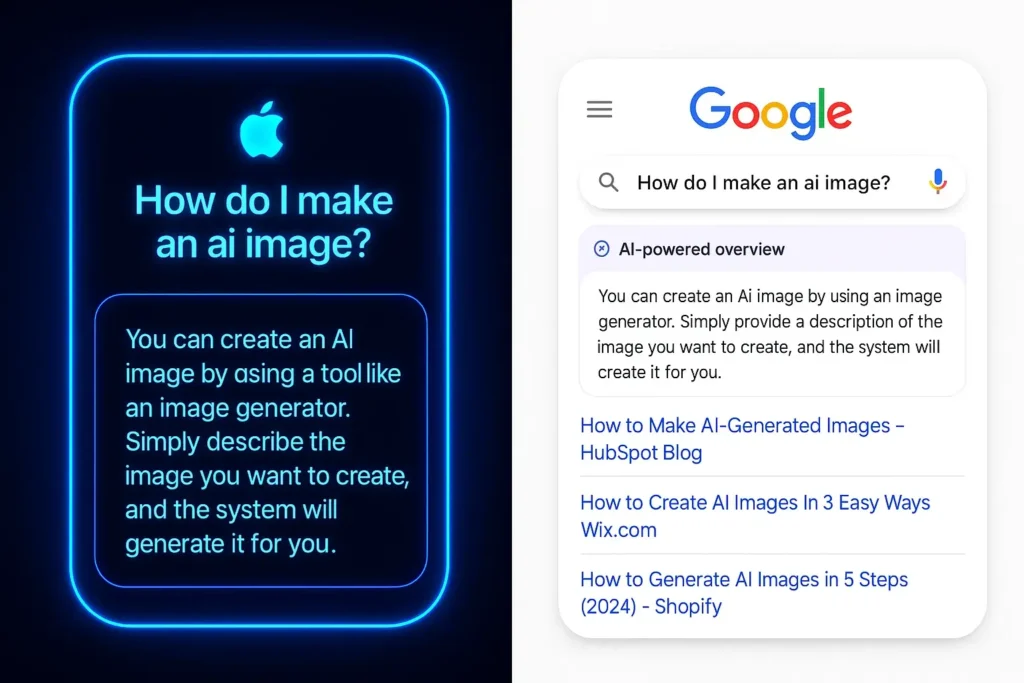
Google + AI Overviews
Google is evolving its own search results with AI features like summaries, “about this result,” etc. Apple’s Google search engine rivalry lies in how each company balances direct answers versus click-through links. Apple’s strength is in tight integration with its OS and strong privacy branding.
ChatGPT, Perplexity, and Other AI Engines
Apple’s WKA is designed more like an enhanced version of ChatGPT or Perplexity rather than a classic search engine. But Apple’s difference could be:
- Tighter integration with device features and context (e.g., reading screen contents, personal data)
- Better control over privacy, perhaps on-device processing
- Depth of multimodal support (images, videos)
- More selective curation and filtering to avoid misinformation
Risks & Challenges
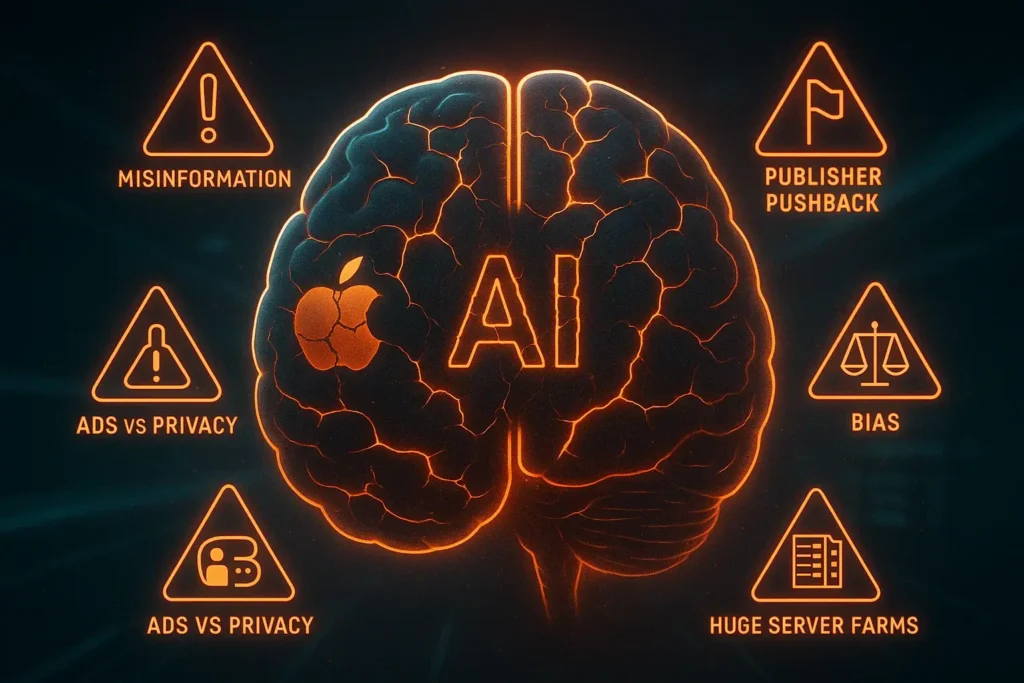
- Misinformation & Hallucinations: Like all generative AI systems, accuracy remains a key challenge. Ensuring the search results are reliable, fact-checked, and free from AI “hallucinations” will be critical to user trust.
- Publisher Pushback: If the engine over-summarises content without driving traffic to sources, publishers may resist or demand stronger protections for their work.
- Monetisation vs. Privacy: Should Apple monetise search through ads, it will need to strike a delicate balance, delivering relevant results without compromising its long-standing privacy-first brand image.
- Transparency & Bias: Unlike Google, Apple has limited experience in openly communicating how rankings or algorithms work. Managing bias, ensuring fairness, and increasing transparency will be essential.
- Technical Scale & Cost: Developing and maintaining a global search index, along with the AI infrastructure to power it, is not only technically complex but also massively resource-intensive.
SEO & Content Strategy in the Era of “World Knowledge Answers”

If you run a website or blog, here are strategic considerations to stay visible:
- Concise, factual content
Answer potential user questions directly and clearly, so AI can pull and display them. - Structured data/schema
Use the FAQ schema, Q&A markup, and structured data to make your content easier to parse for AI summarisation. - Multimedia-friendly
Provide relevant images, infographics, and short videos to support your content. - Authority & citations
Use credible sources and cite them clearly. AI systems often prefer content from recognised publishing sites. - Freshness & updates
Keep content up to date, and AI systems may prioritise recent or regularly updated content. - Avoid overreliance on clickbait titles
If AI generates its own summary, overly sensational titles may be overlooked or misinterpreted.
Wrapping Up!
Apple’s move into building a search/answer engine is one of the most significant developments in the tech landscape in 2025 and 2026. With its internal codename World Knowledge Answers, Apple hopes to deliver concise, multimodal, AI-enhanced responses across Siri, Safari, and Spotlight. The likely release date of the Apple search engine is around spring 2026, possibly March, although Apple has not confirmed this publicly.
For content creators and SEO professionals, this shift means adapting to answer-first experiences by creating concise and high-quality content that AI can parse, rather than solely focusing on ranking. As Apple edges closer to entering the search/AI arena, the balance of power in how people access information may be changing.
FAQ’s
Does Apple have their own search engine?
Not yet, but Apple is reportedly developing one called World Knowledge Answers, an AI-powered answer engine that will deliver direct responses rather than just search results.
What search engine does Apple use currently?
Currently, Apple uses Google as the default search engine for Safari, Spotlight, and other system components. For system-level (local) device search, Apple utilises tools like Spotlight (for macOS and iOS) to index files, apps, and content on the device.
When will Apple’s search engine be released?
Based on reports, the Apple search engine release date is likely in spring 2026, possibly March 2026, tied to iOS 26.4 and a Siri overhaul.
Does Apple have its own search engine?
Again, not publicly yet, but under development. The internal name is World Knowledge Answers.
What is the search engine for Apple?
Currently, for web searches conducted within Apple ecosystems (Safari and Spotlight web results), Apple uses Google. But for on-device searches (files, apps, documents), Apple uses internal search frameworks (Spotlight, indexing). In the future, Apple’s own AI answer engine (World Knowledge Answers) will likely serve many query types.
What is Apple’s search engine called?
Apple has not officially announced the name of its upcoming search engine. Reports suggest that the project is internally codenamed “Pegasus,” but this may change before launch. Currently, Apple users rely on Spotlight for device and web searches, but the rumored 2026 launch is expected to introduce a more advanced and standalone Apple search engine.



